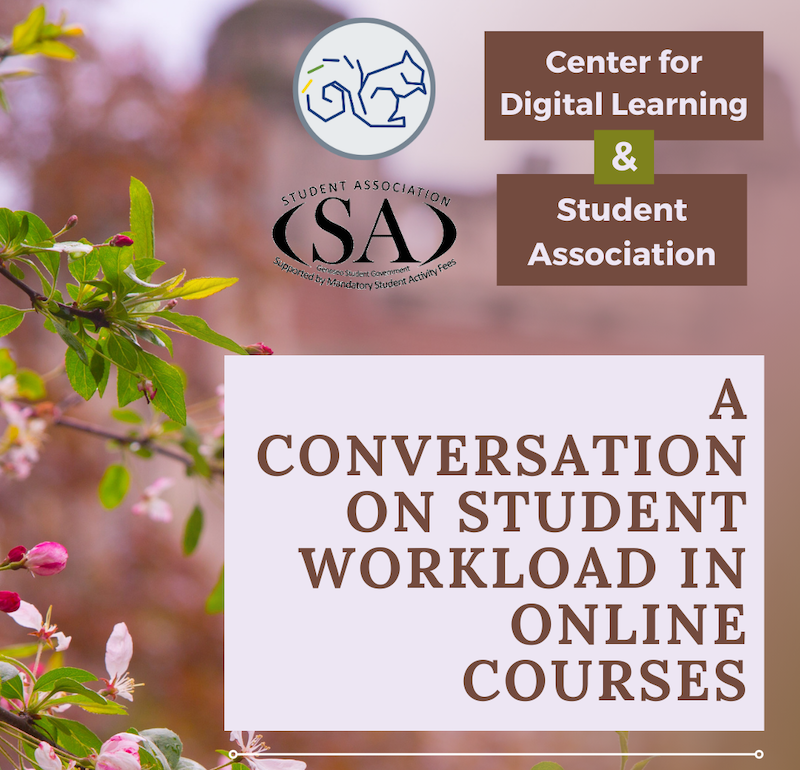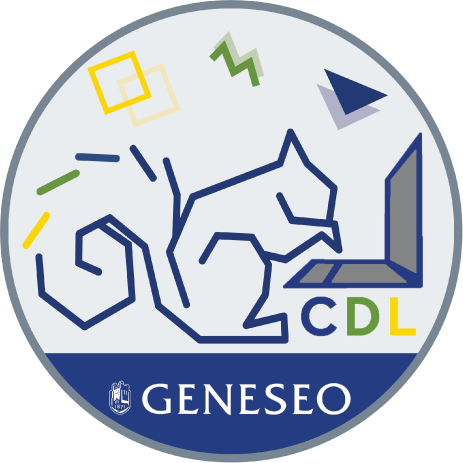A community conversation on student workload in online courses
11 Mar 2021

The Center for Digital Learning and the SUNY Geneseo Student Association are excited to invite members of the campus community — students, faculty, and staff — to a conversation about student workload in online courses.
The Zoom event, which requires registration, will be held Thursday, March 18, 1:45 — 2:45 p.m. Participation is limited to the first 150 registrants.
The pandemic has been hard on everyone. Fear of illness, the reality of illness (one’s own, a friend’s, a family member’s), and the consequences of both (including depression, disruption, and even death) have formed the background to a range of other challenges, including — for both students and faculty on our largely residential campus, with its focus on lively, face-to-face interaction in physical spaces — recalibrating our daily schedules and recalculating the time and effort required for learning when learning must happen in virtual spaces such as Zoom and Canvas.
Hard as it’s been, though, the pandemic has also created a valuable opportunity to re-examine old assumptions and move forward in better ways. We need to ask what the past year can teach us about the relationship between coursework and learning. When we return to in-person instruction at Geneseo next fall, are there lessons we can carry forward that improve every student’s educational experience, whether in the physically present classroom or in the occasional post-pandemic online course that students will likely appreciate having as an option to give them greater autonomy and flexibility?
We also need, urgently, to figure out what we can do now to make sure every Geneseo student has tools and strategies for completing the spring 2021 semester successfully.
The March 18 meeting will be an opportunity for students, faculty, and staff to engage in collaborative problem-solving, to generate concrete suggestions for increasing transparency around workload expectations and flexibility in the design and scheduling of assignments.
But even before the problem-solving begins, students will have a chance simply to share, anonymously, how the workload during this past year of pandemic learning has felt to them. This lived experience must be the starting point for any effort to think in new ways about learning objectives, the work required to achieve them, and the challenge of designing courses with an eye toward values such as compassion and equity.
Last December, Jody Greene, Associate Vice Provost for Teaching and Learning and Director of the Center for Innovations in Teaching and Learning at the University of California, Santa Cruz, wrote a piece for Inside Higher Education titled “The Strange Case of the Exploding Student Workload.” What was strange — in fact, paradoxical — about the explosion she witnessed last fall, she suggested, was that “the more [that well-intentioned faculty] tried to design with student well-being in mind, according to principles widely accepted as appropriate to support learning and diminish stress — principles such as breaking assignments into smaller pieces, distributing assessments across the length of the quarter and helping students stay engaged — the more students told them they were overwhelmed by the workload.”
As I said, the pandemic has been hard on everyone — hardest, perhaps, when our best effort to fulfill our obligations to our work and to each other hasn’t produced the effect we sought.
With an abundance of good will, students and faculty at Geneseo have been making their best effort and then some. But good will alone won’t solve the paradox. We need to talk, we need to think together, we need to find solutions. March 18 will be a chance to do all three.
